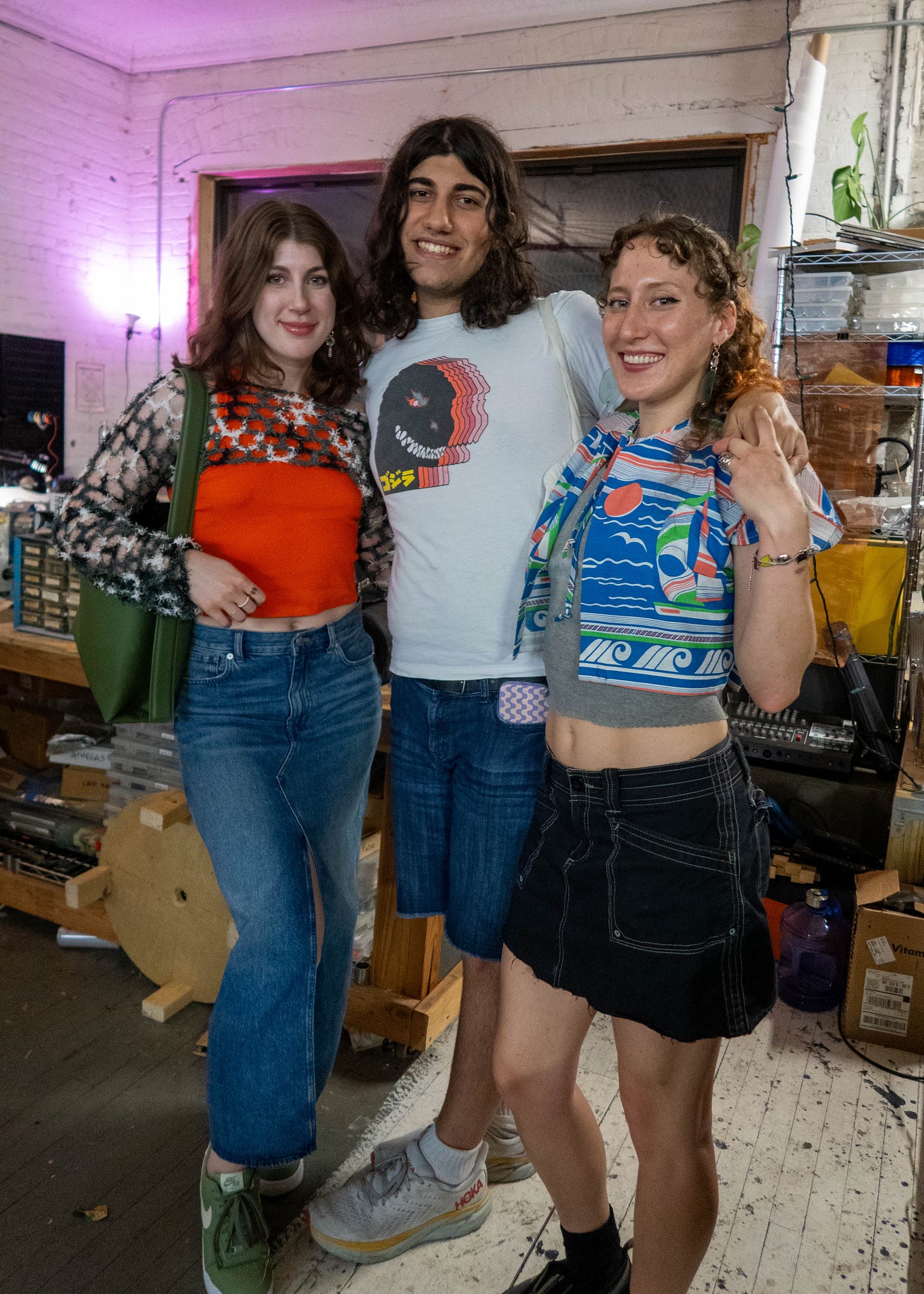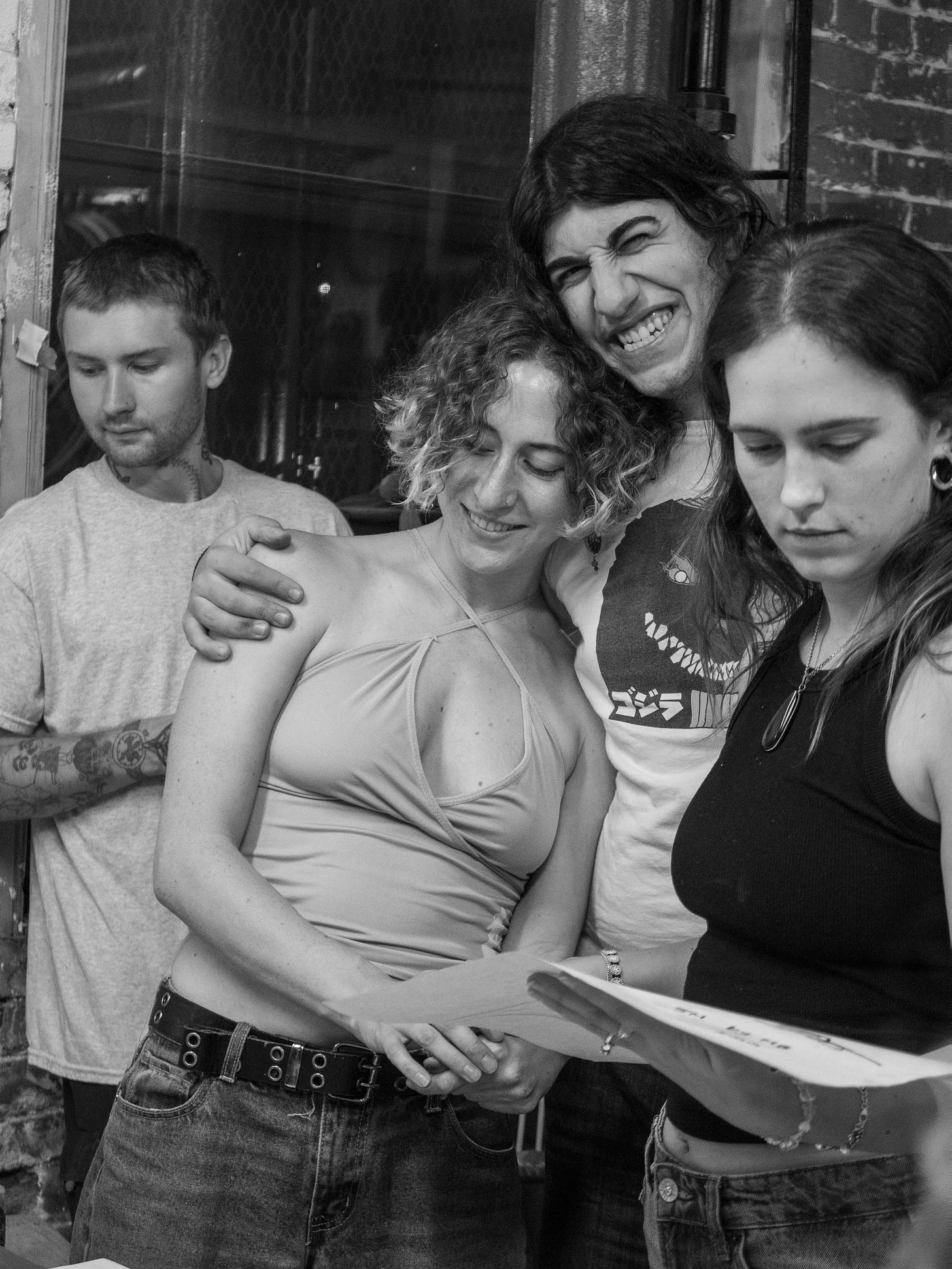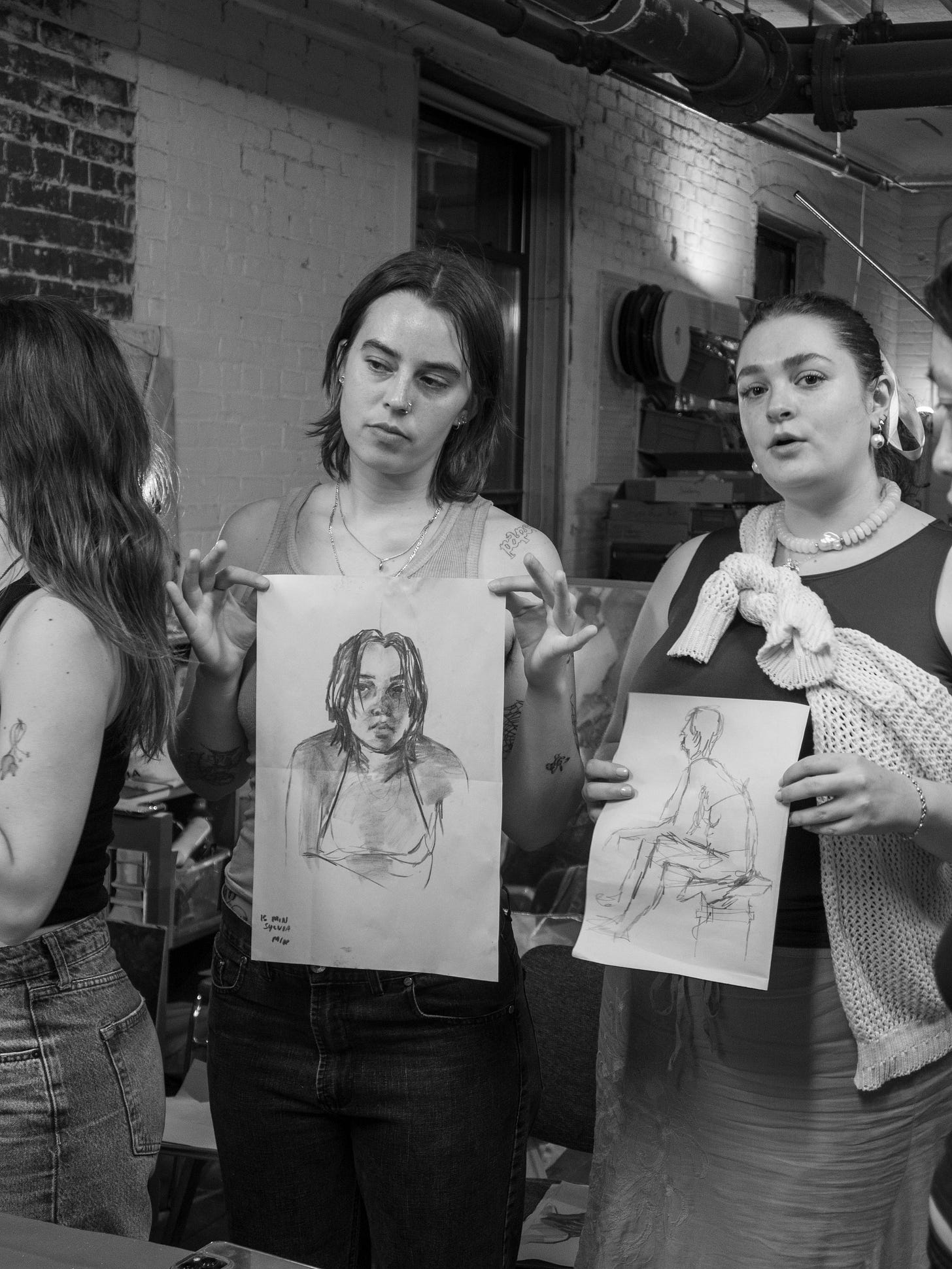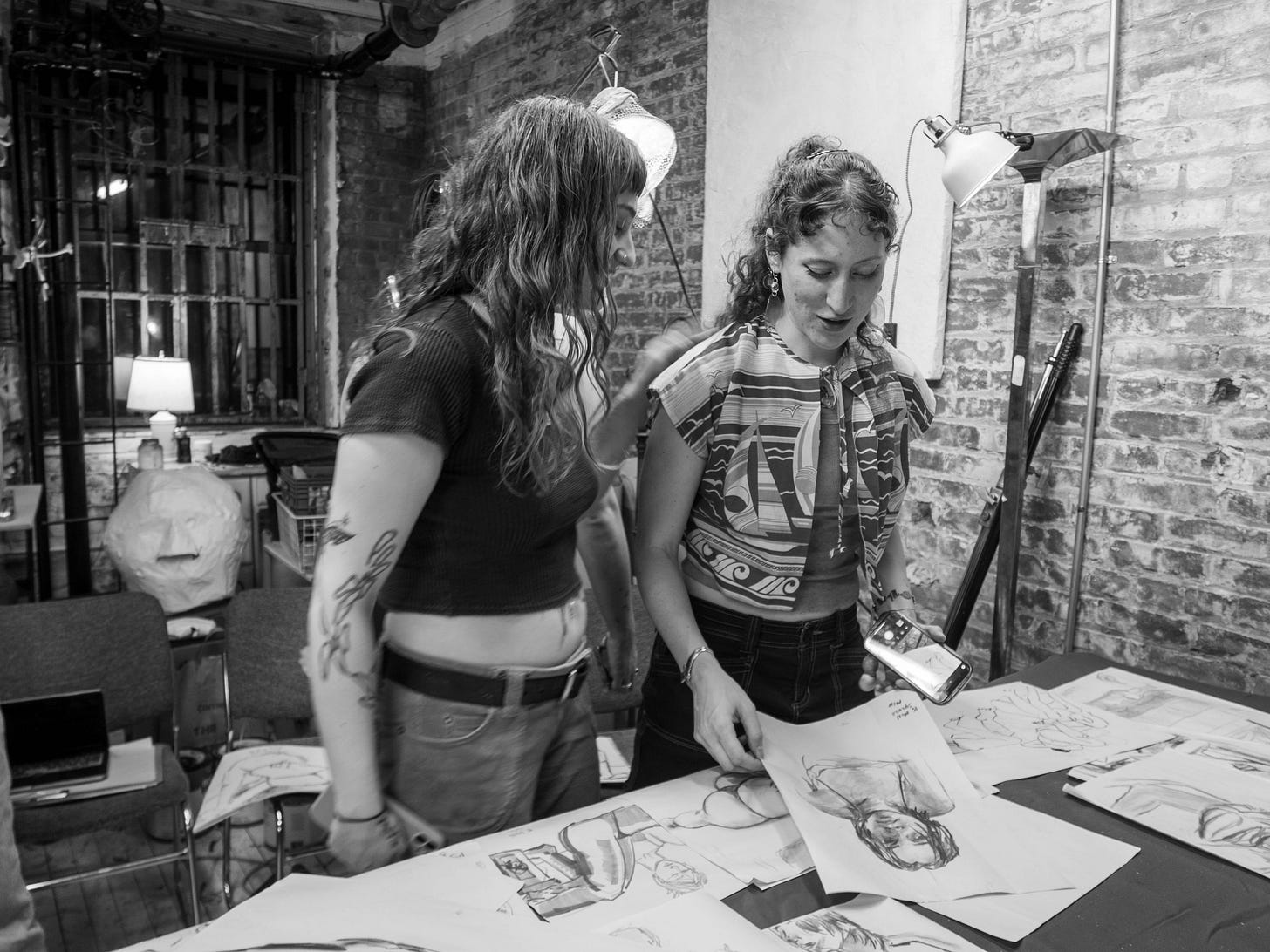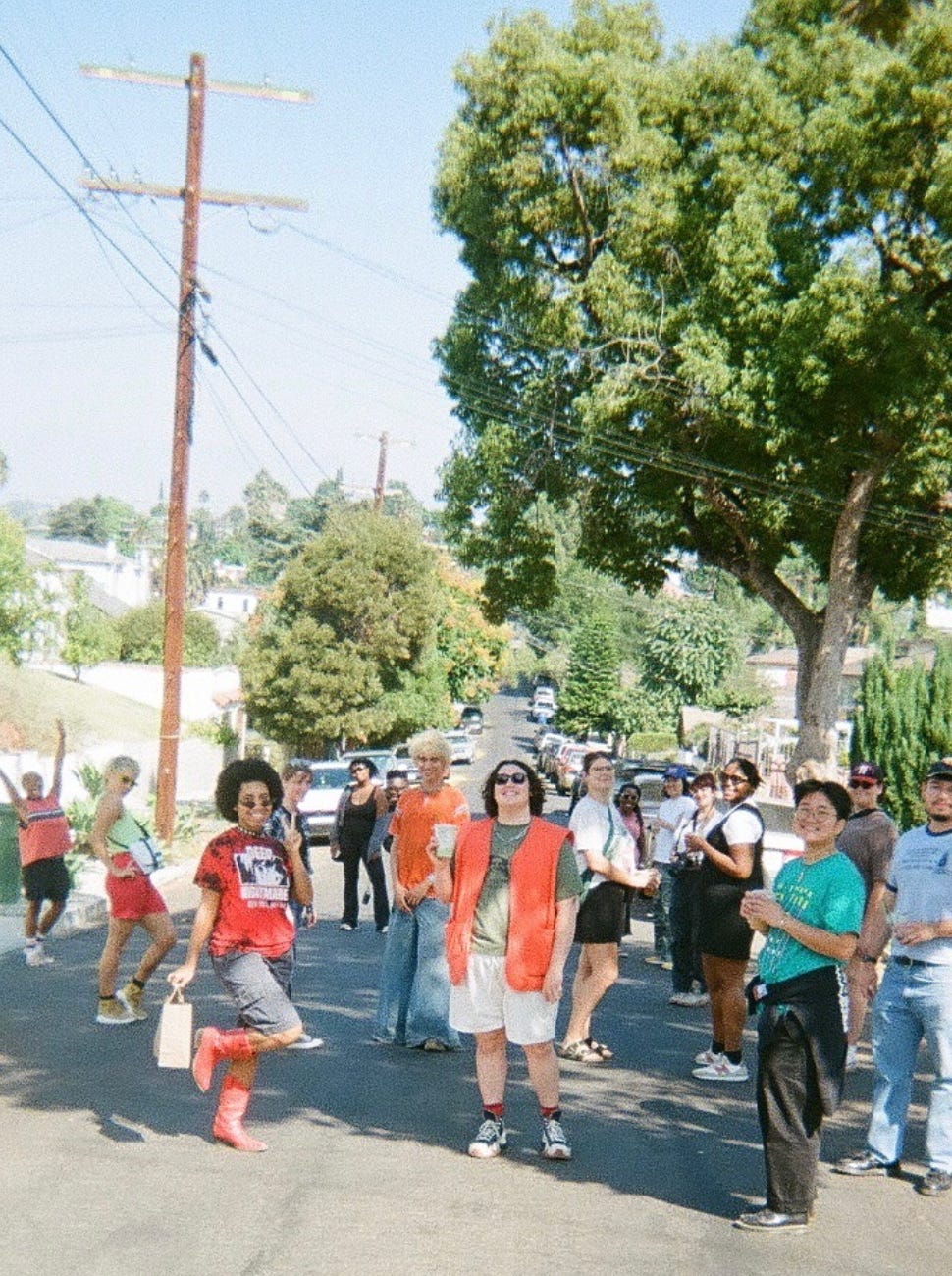On Writing About Queer Friendship
"We were just moving our bodies for the joy of it, breathing fresh air, and being in community with one another."
Note: This post is too long for email, so make sure to read it in browser view to not get cut off!
Hi close friends,
For Pride month last year, I wrote an article celebrating queer friendships:
From the community created between queer Black artists during The Harlem Renaissance in the ’20s and the life-giving friendships between lesbians and the gay men they aided by bedside during the AIDS epidemic in the ’80s, to the thriving nightlife culture born out of the underground ballroom scene in New York in the ’90s, queer culture and history has been defined by the power of friendship.
Today, your queer friends may be the ones you turn to when you are questioning your identity and very existence. They may become your family when you lose your own blood relatives. They may be the ones you call first when you get a job promotion, go through a breakup, or when you want to dance. They may be the ones you talk to when you simply need a good laugh.
To investigate the state of queer community in 2024, we asked queer friends across the United States the question, what do your friendships with other queer people mean to you? While queer romantic love can often be viewed as radical, so can queer platonic relationships.
Like many others, I’ve found that embracing my queerness means more than just defining my sexuality. It’s been about embracing the community, the culture, and the constant reckoning of our society’s standards of what is deemed “normal” or “appropriate”. It’s dating who we want, yes, but also supporting each other through protest, through partying, and of course, through pride. Especially as someone who has been perpetually single over the years, funnily enough, queer friendships have tied me to my identity more than any romantic experience has.
This assignment was the first in a long time that I had pitched to get myself writing again. It took me on a two week adventure packing in interviews between my normal work meetings and during after work hours. The final piece includes quotes from three friendship pairs and one trio, but I talked to so many more folks behind the scenes — a gay duo who run a queer softball league together called the NY “ferries”1, friends who found each other on Bumble BFF, and self-proclaimed “lesbian partners in crime” who wanted to find more sapphic spaces in West Hollywood.
Don’t quote me, but the last time I wrote about queerness publicly, I believe it was when I came out in college while writing for a digital publication that had students pumping out weekly listicles.2 That was almost ten years ago, and it’s almost comical the amount of growth that I’ve had in my journey living out my identity freely since then. And even so, through the process of writing this article, I found myself evolving in my connection to myself and my community.
There’s something that feels so safe about speaking to other queer folks, the way in which you start from a common groundwork and understanding that allows you to openly explore and be vulnerable through conversation, even when you’ve just met! I left every single interview with my heart so full. It turns out, hearing people reflect on their friendships with each other is just as tender as it sounds like it would be. During one interview, I even surprised myself, trying out a new label while introducing myself, because it just felt natural and right and honest in that moment.
Throughout the process of listening to these stories, I also found that building queer friendship is intrinsic to creating queer spaces and vice versa. At the time, I wrote a second version of the piece that actually focused more on this aspect of organizing queer community. Although my editor chose to go with the version you now see, I thought it would be fun to revisit some snippets from those conversations that didn’t make the cut, because they feel just as relevant a year later and it would be a shame if my hard drive and I were the only ones who got to enjoy them! Thank you to everyone who has agreed to let me share their wise words here instead.
And HAPPY PRIDE! <3
Queer Figure Drawing
Brooklyn, NY
Jess, 25, She/Her, Lesbian
Abbie, 24, They/She, Trans woman, Queer
Eliana, 26, She/Her, Queer
Why are queer platonic spaces meaningful to you?
Jess: This [group] has cemented for me how important queer friendships are to me and how important it is to have a safe space. At work, there's not a lot of queer people, so I feel like I need this time once a week, with the girlies. I also now have friendships outside of figure drawing, but that I’ve met through figure drawing. I lived in different cities in Europe and I knew the queer community in London or in parts of Scotland, but then here I got to really know the lesbian community specifically in New York City, which is cool.
Eliana: There's so few queer spaces that are not related at all to the bar. I’ve learned there is that kind of desire for a platonic space. It’s a weekday, there's no alcohol, we're just doing a group activity together. There's nothing sexual. It's just a place to be ourselves and be around other like-minded people.
It really emphasizes the group aspect of it all. We're all sitting around together. When the timer goes off, you'll kind of get up and look at each other's drawings. It leaves more opportunity to be open to meeting new people and being outside the subconscious feelings you might get when you're on a date.
I think it also takes the stigma and shame out of bodies from when they're hidden and sexualized. We're looking at bodies very much just like drawing lines and shapes and shadows, and then when you put your pencil down, it's like, I just drew my friend.
I'm kind of focused on logistics and getting the thing even started and all that stuff, but for the model there, it's a whole different experience. Like you've been a model too, so you can probably speak on that. But from what I've heard, it's very intimate in a way seeing yourself portrayed in 15 different ways.
Abbie: I mean, the actual like modeling of it is very chill fun. Zen. I don't really think about much while it's happening. I’m basically staring into space and just try and stay still, you know? But afterwards, when we're all looking at the pictures, it’s like oh, I never really noticed this part of myself. Or you really emphasized my head and my facial features or you really tried to get my whole body and you showed the pose in a completely different way.
There was this one where I was kind of up against a corner. The way that the person drew it was me very small and they colored in black all around. Kind of like a memory. Like oh, I look kinda like sad in this one. And now that we're all friends, it's just really interesting to see how your friends kind of see you. And I have a bunch of pictures of myself on my wall now. It's a give and take. It's something really special to me.
Also, I do think it's really good to normalize seeing people naked more often in a non-sexual context. The concept of a safe space is very important to it, otherwise it wouldn't work.
I’ve learned that there are moments of intimacy that can exist in platonic relationships that probably in the straight world, there's less opportunities for that. The dim lighting, and just being more comfortable with non traditional [environments], there’s different kinds of boundary making. I like how we're able to stretch what is allowed in platonic relationships.
Queer Photo Walks with TheyMove & Auntie’s Coffee
Los Angeles, CA
Shayne, 26, They/He, Transmasc Non-binary, Queer/Bisexual
Suni, 29, She/They, Trans Non-binary,
What are the organizations you run and how did you all meet each other?
Suni: I am the founder and owner of Auntie’s coffee. We are a queer Black-owned coffee brand in Los Angeles. I started the company from my apartment in West Hollywood in the year 2020. I moved to LA performing in theater and all the theaters were shut down so I pivoted and poured all my things into this community programming.
That led us to TheyMove and Shayne. Prior to moving to LA, we met in New York City. We were both in musical theater school. I was on my way out and Shayne was a freshman. We bonded and connected and maintained a friendship over the years.
Shayne: TheyMove is a community offering from Auntie’s. It is a movement group. I am someone who is in recovery for an eating disorder and as we know eating disorders can be quite rampant among queer and trans folks, especially because the agency that we have over our bodies is consistently dangled over our heads.
I was driving down the highway and I left Suni a voice note like, Hey, what if we started a group where it didn't matter what our bodies looked like and we weren’t doing it to change our bodies. We were just moving our bodies for the joy of it, breathing fresh air, and being in community with one another.
What have you learned about yourself through these friendships with each other and as organizers of these community spaces?
Shayne: I have known Suni through so many seasons of my life and I met Suni before I transitioned or even was really proudly living as a queer person. To have someone that not only I looked up to as an older sibling but someone that I could reach across the table and be going through this journey together with has changed every fiber of my being. Suni is my family.
It’s been a dream to watch one of my best friends follow her dreams, which are ultimately partially my dreams: to build more community to be in community with other people like us. To see myself in another person and call them my sibling is not only a gift, but it brings meaning to life.
Suni: I think the impact of having Shayne as a peer, as a collaborator, as a member of my family, as a friend, is not feeling alone. I've been able to heal so many parts of myself that make it hard for me to ask for help. I'm constantly reminded of the ample amount of support that is available to me whether I choose to acknowledge or use it, and I've been offered the opportunity to reckon with myself, to provide softness to those pieces of myself that feel shameful about asking for help or…receiving support.
It's so funny how much trauma can seep into business and work. I know what it feels like to not feel safe enough to show up someplace as your full self, and to minimize yourself and to suffocate pieces of yourself in the name of making a living, and so my goal with the work that I do in the business of it all is to be able to have a space where people can just show up and just be them for themselves.
What does queer community mean to you?
Shayne: Something that is really beautiful about queer chosen family is that we are not sticking around because we feel like we have this obligation. What if we chose the people that nourished us and took care of us and watered our seeds in ways that many times blood family cannot, not because they are incapable of doing so, but more so because they do not understand how to care for us. Their brains cannot wrap themselves around alternative ways of living that are outside of their traditional norms and structures.
I find myself in a bit of fear about how I will be received and how I will be accepted when I enter blood family spaces in a way that I do not when I engage with my platonic queer relationships. Chosen family — like Suni was saying — can be very romantic. It can hold you in ways that one might find from a partner in the cis-hetero world. It doesn't have to be because someone is interested in you sexually, it can just be because I want to show up for you because I love you and it is okay to love you big and loud.
Bandmates, Saving Fiona
Lincoln, NE
Madeline, 24, They/She, Bisexual
Kaila, 24, She/Her, Lesbian
Annie, 24, She/Her
Ellie, 23, She/Her, Gay
What type of music do you play?
Madeline: Initially, we were a sad girl rock band. We kind of came to hate that because first of all, calling something a girl band is kind of reductive and also we're not all girls.
Annie: When we first started, we were not a hundred percent sure on our identities and the girl title was at least a way to kind of put us on the map because I think a lot of people saw that and were really ready to support us because there was a no-men band in the scene. I feel in a way that helped us and made us unique.
But as we grew, we were like, maybe we're past this now. It doesn't match us anymore. And I think we need to be honest about who we actually are. We were thinking about a lot of musicians that we listen to and we love Mitski, but I think she herself actually did make some comments about how she's often regarded for writing a lot of sad music, but eventually she was like, I don't want to be boxed in. I think that we kind of came to terms with that too. We have music obviously about being sad, about being heartbroken, and stuff like that, but we have songs about friendships that didn't work out and complicated other feelings and religious trauma.
Kaila: I would say we're in the bubble grunge genre. Mannequin Pussy would probably be the high key end of bubble grunge and then Soccer Mommy is the gentle end.
Annie: I think the other reason why it's kind of hard to put a label on our music is because we all write music in the band. I think when we come together, it sounds a lot more cohesive. But I think at the very beginning I feel like all of us had really different writing styles. And so that kind of makes sense that we have songs that are a little bit more like heavy in nature, like more Mannequin Pussy-esque, but then we have some stuff that's maybe along the lines of Phoebe Bridgers and Soccer Mommy.
Madeline: Also we joke, but there is a lot of emo influence.
Ellie: I would say we’re firmly in the Indie Rock camp.
Annie: Indie alternative.
Ellie: Yes.
What have you learned about yourself from these friendships and being in a band together?
Madeline: I've learned a lot of confidence because it's so scary to get up on stage and perform for people. Annie and I have trauma from being in piano lessons as a child and it's so freeing to be able to go out there and not worry if you're gonna make a mistake and just kind of own it all.
I would not have done this if I didn't love my friends because the only reason I decided to be in a band in the first place was because I knew Annie and Ellie wanted to be in one. I would have never thought that I was capable of something like that and so those relationships have brought me so much confidence. I felt like I was gonna mess it all up and they've just been constantly reassuring, but it's not just like yes men, they are also challenging me to do better all the time. My friends are incredibly talented and every day I'm in awe of the fact that I'm associated with these people.
Ellie: I think just being vulnerable. It's taught me to be more comfortable with that because all the songs that I've written for this band are from the trenches of my soul. I have cried while writing every single one of them. And then the vulnerability of the first time playing in front of other people where it's just your voice and a guitar and you're like, this is my song!
And then everyone just being so encouraging and being like, we're gonna make this something really special and really cool. Then believing in these words that just started out as my way to process what I was going through have been turned into this beautiful expression that I'm creating with friends and that is joyful and brings us together has taught me how to be comfortable with my emotions. To hear everyone else's ideas and songs and just sharing in our most intense emotions and creating beauty out of it is very cool, and I think what makes our friendship so solid.
Annie: I think also being a capital A, Artist, sharing music is such a deeply vulnerable thing and sharing your art is such a deeply vulnerable thing. Before I met everyone, I had never really written music much before. Being friends with these people have really encouraged me to actually do it because writing a song is so scary. I'm writing about stuff that is deeply mortifying and embarrassing. It's like you're literally listening to my diary.
But it's nice to know that there are people in this band that help you take your art seriously and this is not just your diary. It's a really good bop. We always talk about how it's so funny that people are gonna listen to these songs and be like, this is just a song, but then every one of the band knows what mortifying experience happened for us to write this music. I think that's kind of cute that we can keep that secret to ourselves. I love that I can share music with my friends and they can share their wonderful songs with me and it's fun.
What does queer community mean to you?
Madeline: I think there's just a deep understanding of solidarity like you feel. I think especially growing up in the midwest, when you think about the wider culture, it makes it seem like you're so alone, but my queerness feels extremely normal in this group. It is so mundane. I just feel like a normal guy. There’s no tiptoeing around queer issues either because it's just our everyday life, and you can be really chill and honest with each other also. Everyone gets it, but it can also be not that deep, and that is such a relief because there's so many other places where you have to present yourself. Like this is my sexuality. This is what I am. I'm valid. Whereas in a queer space like this, where it's just you and your friends, you can just kind of vibe.
It's like you don't have to explain as much. You can just cut right to the meat of the issue. It's not oh my god, you're in love with a girl. It’s, of course you are, let’s get into it.
Pun very much intended.
To my own mortification, that article as well as others featuring Pretty Little Liars gifs and descriptions of how Beyoncé’s Formation tour literally changed my life still exist in the depths of the internet…




